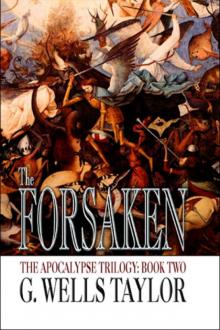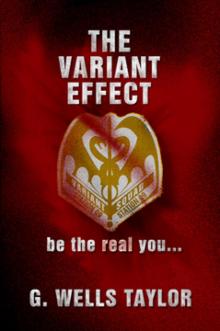- Home
- G. Wells Taylor
The Urn Page 8
The Urn Read online
Page 8
With the first motion of the vessel, I climbed the ladder topside and found an unoccupied space by the rail away from the busy crew where I could watch as the Allison Jane moved away from the Varna docks and the many other ships anchored there.
We cut a quiet path through the water’s mirror surface, slowly picking up speed as the sails flapped weakly before catching the ocean breeze.
Ahead of the wind, the schooner traveled quickly out of the bay and on the way we surged past many shore-bound humps of hills and twisted jetties of native stone.
I chanced then to see a pale, gray thing on the shore atop one of the rocky outcroppings where grew a tangle of dense conifers and brush. The thick overcast must have given it liberty to be about at such a time, though I did notice that it would not come far from the shadows of trees that grew in abundance there.
I saw first one ghoul, and then another of the gray creatures stand, and then more; their crushed, disorganized faces twisted with malice, glaring from the underbrush as they watched my leave-taking. I thanked the gods I was not to spend another night on shore, for I counted 16 of the brutes there.
My Szgany brothers sang merry songs. Why not the Gypsy Horvat? It is said that the Szgany tribes find voice for music in the darkest of times, and yet... The words were there for me, but the tune was lost, and my heart was too bruised to find it.
I was tired. My voice was a hoarse thing made raw from the cold wind in the mountains, and like my body, was worn and weary. True, I had accomplished a great feat, journeying through ice and peril from the castle to the sea, and overcoming my fears to bring the master’s urn the first—but was it the most dangerous leg of my travail? So I hoped, but now...
Off to places unknown.
I had my possessions, my mission, and the master’s urn, but with the loss of my poor Baba had come the realization that I had little else left to care for. I was leaving the only other things I had ever found familiar: my Gypsy brothers, the castle on its mountain perch, and my years of faithful service in its halls.
And yet, I had that service still. It was my only companion, but these duties that had caused my heart to swell with pride in the past now clouded it with doubt, and while I loved my master, in his diminished state I was left to suffer alone.
There, in my isolation, even his disdain might have cheered me.
I was too tired to overcome the feelings of my despairing heart, so I toiled at rest and passed the first few days in my tiny cabin—crammed into the space, too exhausted to consider sleep or comfort.
There was no song in my heart, but a story to tell? Yes, that was it, to pass the time when I was awake in my cabin and dared not venture out on the deck and bear the scrutiny of the sailors who moved about the ship, or dangled in its rigging despite the joyful magic they had worked upon me.
I was cheered, it seemed by those brawny angels that tended the vessel, for the sailors sang at their work and at their leisure, and I found it heartening to hear any of their songs.
Their voices rolled over the deck above me during the day, and at night muted, sweet ballads were crooned to the sway of the ship sending mysterious notes shifting ghost-like through the shadows as the hull boomed and moaned around me.
But their spirit cheered me, and with the lightening of my own heart came alignment with my greater mission in the service of the master. I realized when I boarded the schooner Allison Jane that I would have the time and leisure to despair, or to do my duty, and tend my courage for the days ahead.
So I began my journal, a story of all that had transpired, and if the saint preserved me, would continue to unfold as I moved the master’s remains toward his South African ally. I started at the events that first occurred when the westerners had attacked my master, and sent me overland through peril, pain and loss and put me aboard a ship with the urn so close at hand, and now so quiet.
I wrote it by the light seeping through the porthole when I could not sleep in the day, when the urn often went still and the seabirds called overhead, or in the soft light from my small lamp at night when the sailors hummed and timbers creaked as we rose and fell on the rolling swells.
The dangers of the desperate journey had kept me from attempting such a record while still on Transylvanian soil, but the notion was born there in the night when fear kept me from sleep, and so I had purchased a journal, ink and pen with my other supplies in Varna, thinking that the sturdy deck of the ship, the long voyage, and my isolation would make this cabin the better place to write it.
I know that keeping a journal flies in the face of my master’s wisdom, but writing it in the same ancient tongue in which he wrote his book of instructions would protect the contents from any but his eyes should he ever be brought back whole and well from the disembodied state he now was in.
If the chronicle was not simply lost. With the vast ocean swirling around us and pitching many miles deep beneath the fragile vessel, it was more likely to disappear into the depths with its chronicler and all else.
So why would I do this when my master had forbade any such iteration of our retreat? I was as moved as any man might be when far from home in alien surrounds, with nothing more to remind him of his past than his memories, and nothing to link him to the present but his actions.
Perhaps this was a letter to my dear master, and should I not survive to see his return, he would know the love with which his loyal Gypsy had served him.
Writing that, I could not help but set a protective palm upon the urn’s covered surface to feel its warmth. It was true, since coming aboard, the urn had been mostly silent, but it had grown warmer by the day.
We had set sail for Morocco on the 12th of November, 1893 and headed south for the strait at Bosphorus that we entered on the 18th before making good speed through fine weather with little to report in way of experience. The moon appeared in the first nights that followed, as the clouds permitted, waning as we traveled west.
The ship passed so swiftly through the scrutiny of Turkish inspectors and customs officers that I imagined some kind of payment had been made. There was much jocularity and back slapping between one sashed and mustachioed official and Captain Duvall after a small bag was passed from the latter to the former as they stood on the wharf.
I watched this through the porthole in my cabin, for I stayed below decks at that time, with the master’s urn disguised beneath blankets and hidden behind my pack with my loaded musket and my sword. The captain had said that I should only come up on deck if he called, but added that such formalities or searches were unlikely.
What would I have done had there been a search? I could not say for I could only imagine the worst if customs officials had discovered the master’s urn. In such a case, there would have been another exchange of money, or of blood.
On the 19th, we passed through the Dardanelles with the winds playing to our favor in this instance, and I overheard sailors saying one to the other, that it seemed the tides themselves had turned to speed our passage through the strait from the Sea of Marmara and on into the Aegean.
The coming week was sure to go slowly, but it would give me more time to recover from my exertions in the mountains, and to heal whatever strains and bruises remained. Perhaps I could use the time for simple reflection. Much had changed in my life, and I needed to regain my strength for what lay ahead.
I continued to feed myself with preserved fruits I had purchased in Varna and other things: nuts, bread and sausage. I am offered a bowl of the crew’s fare at sunup and sunset. I should have declined, as acceptance brought one of the crewmen near my quarters to deliver it, but decided that a refusal would have drawn more unwelcome interest than any glimpse a sailor might get inside my cabin or whiff of its close atmosphere.
21st November, 1893. More changes have come to the contents of my master’s urn. The daily ration of pig’s blood was having an interesting effect, though the degree of these evolutions did not become apparent until we had traveled well into the Mediterranean Sea.
Again, the body was worm-like with ridges denoting sections and the eyes were set in a bulbous knob at one end. They watched me for a time before turning away, and the bloated shape rolled and wriggled until it was buried beneath the thick gore there.
I was unable to see more for the black substance that had once stained the bottom and sides of the container had continued to grow upward and now covered the inside of the lid. There it sent thin black veins onto the outer surface through the vent while lowering viny tendrils that dripped like icicles and formed an obscuring blind inside.
I feared tampering with the dampers, for the web-like forms had wrapped around them in such a way as to keep the vent open. I resisted further inspection and adding more light to my investigations since the thing I had glimpsed inside clearly preferred the shadows.
23rd November, 1893. We passed by Gibraltar and through the strait today, and are due to reach Casablanca, Morocco in the morning. The “rock” was magnificent and its promontory had reminded me of the mountain upon which the master’s castle sits. I was overcome with homesickness momentarily, but the feeling was quickly dispelled as my mind returned to the odd occurrences that had been reported on the ship.
LATER and the ship was quiet, though I doubted that meant anyone aboard was sleeping soundly. Strange things had been occurring for two nights now. November 21st had one crewman complaining to Captain Duvall that he’d seen a ghost. Duvall had him clapped in irons for drinking on duty, as I learned from a sailor who had been sent to query the crew about the disturbance.
On the night of November 22nd, two more sailors had reported a glowing green face looking down at them from the crow’s nest high atop the mainmast.
I wished that I could keep watch with the others, for I had a keen interest of my own. Stories of a glowing face had reminded me too much of what I had witnessed in the master’s tower, and I prayed that some fell thing had not followed me and the urn, or worse had accompanied us for the duration of the trip.
23rd November, 1893. I did not know the time. The sky was black. A sailor had reported seeing a face in the crow’s nest again, and Captain Duvall investigated before ordering the crew to stop the chatter about ghosts. He had also released the previously imprisoned sailor without further penalty or apology, and then called us all out to the deck to witness something that he said would clear the thoughts of haunting from our minds.
He had ordered the lanterns shuttered before pointing up to the mainmast, and all of us gasped at a spectral blue-green light that clung to the rigging and structure. A single glowing ball of flame had formed that had us all crying out as it suddenly rolled off the ropes and disappeared in a flash.
“That’s enough, now!” Captain Duvall had grated. “Damn you fools, that’s St. Elmo’s fire! No harm to man or beast. No more than crickets and lightning bugs!”
The exclamation had been followed by a joyous shout as the crew was brought to realization and chastised for their superstitious thoughts.
One crewman nearest me had explained in halting English: “It’s something as comes with weather sometimes. Like lightning, or a spark from flint.”
I was not so easily persuaded however, for the light had reminded me of something else.
24th November, 1893. The ship had docked in Casablanca before I met the captain in my room just past noon. I had been impressed with Duvall’s stern command of his crew for it reminded me of my master. In fact, his demeanor had encouraged me to believe that he might understand my predicament, and that he would be open to some practical application of the gold I carried.
So I had begged him to meet me in my room where I might speak to him about a business proposition and he had agreed without a moment’s hesitation. Life on the sea would not be long or profitable for a man prone to procrastination.
Duvall easily understood my lack of experience in seamanship, and had agreed to act as my agent and be discreet regarding my affairs as he queried other captains at the dock about buying me passage aboard a ship headed south along the coast, hopefully as far as South Africa.
However Duvall’s service had proven expensive.
A stern look had come upon him as he explained that he only had a day’s layover in Casablanca that would require his complete attention. The Allison Jane was to be inspected and supplies had to be laid in.
When I thought he was primed to reject my plea, I may have acted precipitously when I drew from my pocket the silver necklace I’d brought from the castle.
He had frowned as his eyes slid over the rubies that dotted its entire length, but a smile soon twitched at the corner of his mouth as he judged their authenticity.
“This would buy you passage around the world and more,” he had grumbled, eyeing me over the chain. “Am I to take a cut from this as agent?”
“Take from its value the price for my passage to South Africa, and the rest, please receive as payment in full, Captain Duvall,” I had said, shaking my head grimly. “For I hope to travel soon and most quietly.”
“Ah,” Duvall answered, hefting the necklace and catching it. “Soon and quiet it shall be.”
I nodded when the captain left, having sealed our silent bargain.
As I awaited his return, I hoped that I could be on my way as quickly as possible. Captain Duvall had an honest look, and must have understood the necessity of having others believe his word, so I did not think he would cheat me.
Reputation would be prized in a seafaring life, since as a merchant captain he was guardian of his ship and cargo, master of his crew and judge of their fates.
The port was a busy one, but I did no more than glimpse out the porthole at the many ships of varied flags and nationalities that were tied up by crowded and bustling wharves of wood and stone.
I was sitting on my bed and listening to curious fluting music that came to me upon a warm breeze scented with spice and sewage when a monstrous braying sound rattled the ship. I chanced to peer out at a figure wrapped in cloth from head to toe who stood on a dusty pier by a hideous beast.
I knew the man must be of Muslim heritage, as I’d heard stories about their attempts to conquer my master’s lands. Always were they thus described, covered in robes and veils so as not to insult their god. But the tales said that beneath the cloth were most formidable warriors with long black beards and piercing eyes, with steel armor covering their strong, dark limbs.
But what the man led by braided rein was a beast whose origin I could not guess. It was no horse, lacking all fluid lines, and was long-necked with a hump on the back of its large, square body that seemed out of place with its thin and knobby limbs. Its ugly face would not even bear description.
It pulled at the rein and as its load of heavy bags shifted, it bellowed again.
I backed away from the porthole and was glad Morocco was not my final destination, for what kind of a place could breed such a monster?
This fright put me in mind of the things we’d witnessed upon our voyage. The crew still seemed embarrassed by their dismay over St. Elmo’s fire, and was anxious to put the incident behind them.
I was still concerned by the discrepancy in the reports because the first sailors had described a “green” face leering down from the mast. We’d all witnessed a blue-green ball of light over the ship that reminded me of the faerie fires I’d seen in the Transylvanian forest, and I realized that I had been through too much in my life to ever think a thing as innocent again.
And I could not forget the pale face at the castle.
CHAPTER 6
FROM THE GYPSY HORVAT’S JOURNAL
25th November, 1893. The Westerner Goes South
South Africa awaits!
Captain Duvall had returned to the Allison Jane two hours after
our discussion to tell me that he had booked passage for me upon the Westerner, claiming that he had done so for only a fraction of the silver necklace’s value. As he had not requested any additional money or valuables for acting as my agent, I could only imagine that the portion remaining to him had been great indeed.
The Westerner was a steamship of some age and history that could also operate as a sailing ship. Many vessels that were exclusively steamers or sailing schooners like the Allison Jane carried cargo up and down the African coast and from all points of the compass there, and many of those subsidized their operation by taking passengers in simple rooms reserved for that purpose.
The Westerner would do the same, taking me south in stages, and from port to port, with the ship picking up or delivering passengers and cargo as the opportunities arose.
Without further discussion, Duvall had given me my ticket and drawn a small map upon a crumpled piece of newsprint to where I would find the Westerner’s berth.
He said it was not far, and as I had awaited Duvall with my possessions packed and ready to go; I was soon standing on the dock before my transport to South Africa.
Duvall had informed me that the Westerner was a ship of some 90 feet in length with a crew of 25. Its black hull rose to eight feet above the waterline where a deck of polished wood ran from bow to stern. On this was a covered steel and wooden structure or building about ten feet in height that covered most of the deck and no doubt formed the inner architecture of the vessel. Round windows dotted this structure, interspersed with doors and other access hatches.
A good-sized cabin was mounted atop that and set almost center to the first raised structure. This had many windows and I was later informed that the captain piloted the vessel from inside that elevated room. Behind it rose a single black funnel through which smoke from its steam engine would be released.

 Dracula of the Apes 2
Dracula of the Apes 2 Dracula of the Apes 3
Dracula of the Apes 3 The Urn
The Urn Painkiller
Painkiller The Forsaken - The Apocalypse Trilogy: Book Two
The Forsaken - The Apocalypse Trilogy: Book Two When Graveyards Yawn
When Graveyards Yawn The Variant Effect: PAINKILLER
The Variant Effect: PAINKILLER When Graveyards Yawn ta-1
When Graveyards Yawn ta-1 Painkiller tve-2
Painkiller tve-2 The Variant Effect
The Variant Effect